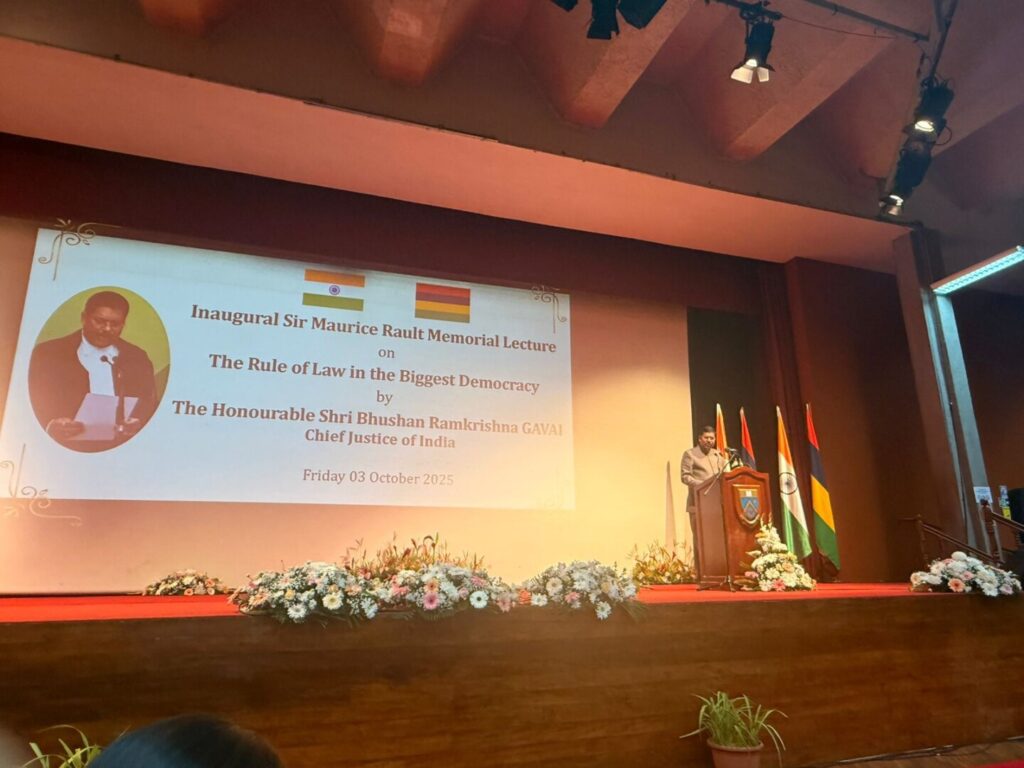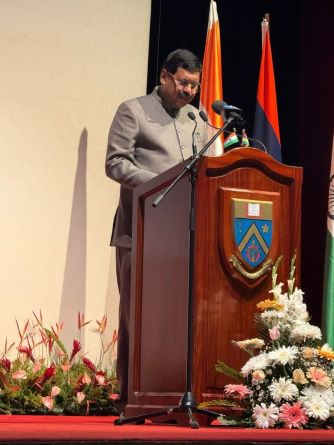Mauritius Lecture: CJI Gavai Says Supreme Court’s Bulldozer Ruling Ensures Law, Not Bulldozer, Governs India
(By Syed Ali Taher Abedi)
Port Louis, October 3: Chief Justice of India D.Y. Gavai, while delivering the prestigious Sir Maurice Rault Memorial Lecture at the University of Mauritius, emphasized that India is governed by the rule of law—not by bulldozers or arbitrary authority. His address focused on the foundational principles of democracy and justice in the world’s largest democracy.
Speaking on the theme of constitutional governance, CJI Gavai underscored that democracy thrives when laws serve justice rather than become tools of unchecked executive power. He invoked Mahatma Gandhi’s talisman and Dr. B.R. Ambedkar’s constitutional vision as enduring moral compasses for governance.
A key highlight of his speech was the reference to the Supreme Court’s 2024 judgment in the so-called “Bulldozer Case,” which laid down critical safeguards against executive overreach in the demolition of homes belonging to accused individuals. The ruling, he noted, sent a clear message that constitutional values must prevail over populist impulses.
Paying tribute to Sir Maurice Rault, former Chief Justice of Mauritius, Gavai quoted Rault’s assertion that “law must remain supreme, not the individual,” and echoed his caution against excessive discretion in the hands of authorities. He also reflected on the historical and cultural ties between India and Mauritius.
In a sweeping review of India’s constitutional jurisprudence, CJI Gavai revisited landmark Supreme Court judgments including Kesavananda Bharati, Maneka Gandhi, Shayara Bano, and Joseph Shine, highlighting their role in shaping a rights-based legal framework.
His lecture served as a reaffirmation of India’s commitment to constitutionalism, justice, and the enduring power of judicial review in safeguarding democratic values.

The CJI traced the intellectual and historical bond between India and Mauritius, noting shared legal traditions and constitutional ideals. Recounting the Indian Supreme Court’s trajectory of landmark rulings, Justice Gavai highlighted iconic judgments such as Kesavananda Bharati, Maneka Gandhi, Shayara Bano, Joseph Shine, and the 2024 verdict striking down the Electoral Bonds Scheme. These rulings, he said, enshrined the rule of law as a substantive principle of India’s constitutional democracy and dismantled arbitrary executive actions.
Quoting the celebrated words of Justice P.N. Bhagwati in E.P. Royappa, Justice Gavai reminded the gathering that “equality and arbitrariness are sworn enemies; one belongs to the rule of law in a republic, the other to the whim and caprice of an absolute monarch.”
He further said that “In the modern era, our relationship has blossomed into a strong partnership of trust, development, and solidarity. India has been a reliable partner in Mauritius’ journey of progress, whether through development initiatives, transformative infrastructure projects, cultural collaboration, or the safeguarding of maritime security. Mauritius, in turn, has never wavered in extending its support to India in our moments of need.”
He stressed that the Rule of Law cannot be applied as a one-size-fits-all formula, nor can it be regarded as a universally uncontested doctrine. Every society inherits distinct traditions and develops its own understanding of the concept, shaped by political struggles, historical legacies, and cultural values.
“This shared journey has shaped our societies, our values, and our enduring commitment to justice, freedom, and democratic governance. The dialogue on the Rule of Law acquires greater significance when viewed against this shared context.”
While concluding his lecture he offered a philosophical reflection
“The Rule of Law is thus not a rigid doctrine but a conversation across generations, between judges and citizens, parliaments and peoples, nations and their histories. It is about how we govern ourselves in dignity, and how we resolve the inevitable conflicts of liberty and authority in a democratic society”
The lecture was attended by the President of Mauritius Dharambeer Gokhool, Prime Minister Navinchandra Ramgoolam, Chief Justice Rehana Mungly Gulbul, leaders of opposition, Parliamentarians, and members of the Judiciary and Diplomatic Community.




